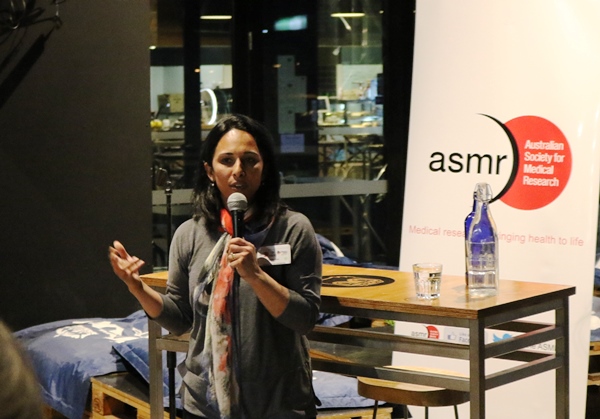Marcus Butler
15 August 2016
One of the University of Canberra’s leading researchers Sudha Rao, has traded the laboratory bench for the bar to share the latest in her world-leading cancer recurrence prevention research.
A crowd of more than 50 academics, students and members of the public gathered at The Well on 8 August to hear from the professor in molecular and cellular biology.
The inaugural Scientist at the Pub event was opened by Acting Vice-Chancellor Professor Frances Shannon who used the opportunity to encourage more women to consider a career in science, technology, engineering or mathematics.
“I’m proud that the University of Canberra has made its position on equity and inclusion clear and that we are committed to promoting STEM fields to female students and researchers,” Professor Shannon said.
“Events like this give people the opportunity to engage with our researchers, but it also helps our scientists to discuss their work outside an academic setting.
“Sometimes changing the way we think about our work and talking about it with people who are unfamiliar with the subject can inspire new areas of thought,” she said.
Professor Rao began by introducing her research, which focuses on ending the recurrence of breast cancer and other aggressive cancers.
“My team works with cancer stem cells which are responsible for metastatic disease in cancer survivors, which causes the recurrence or spread of the cancer through the body.
“Our work has identified proteins within these cancer stem cells which can be targeted and switched off, and coupled with standard cancer therapies we hope that this work can end cancer recurrence.
Professor Rao also responded to a question from an audience member who works with cancer patients and survivors, on how her work could change the lives of sufferers.
She said that standard therapies will still be used in the future, but the emergence of personalised medicine means that patients can receive individualised treatment to better target their cancer.
“Current therapies and early detection will remain key factors, but my work is aimed at giving that standard care a huge boost; improving its effectiveness and giving people a much better prognosis for survival,” she said.
Scientist at the Pub was co-hosted by the Australian Society of Medical Researchers and supports the University’s commitment to the Athena SWAN charter pilot program, addressing gender inequity in STEM fields.
Dr Rao has recommended the Scientist at the Pub event for other researchers keen to share their work beyond academic circles.
“As a researcher you get very used to speaking with other researchers, but I jumped at the chance to present at this event because it’s a real opportunity to bring my work to the people who may one day benefit from it,” she said.



